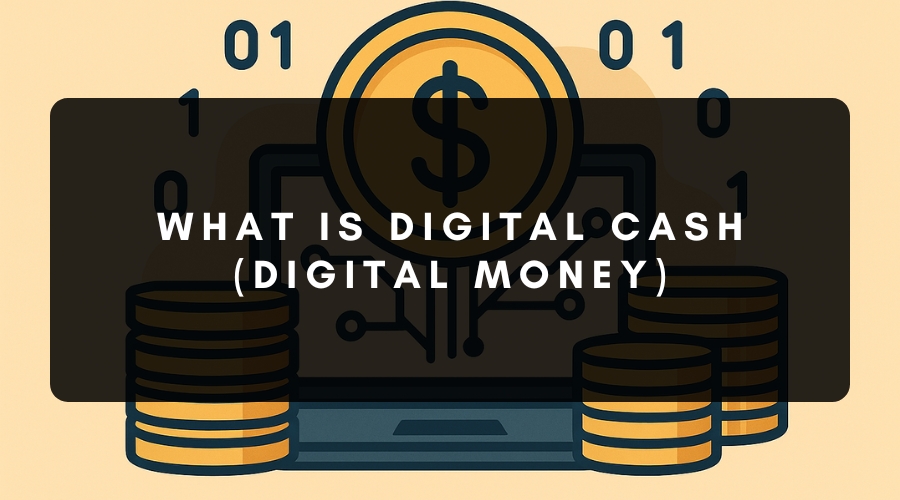
What Is Digital Cash (Digital Money)?
Digital cash is more important now for doing business than it ever was before. The world is moving quickly from physical money to digital substitutes, affecting business owners everywhere (including Europe).
Contemporary commerce requires accepting digital cash, as well as understanding how it functions and how digital transactions (both online and in-store) are made possible by payment processors and payment gateways.
Digital Cash Is the Modern Evolution of Money
Digital cash is a digital representation of traditional currencies like the euro or dollar, stored and transacted in electronic form rather than as physical banknotes or coins. Unlike physical money, digital cash is not something you can touch; it exists only in computer systems and is accessed via bank accounts or mobile apps (especially since the rise of digital banking).
In the early days, money was tangible. But as technology advanced, electronic money became a practical way to conduct transactions over the internet. Today, digital forms of currency are used for everything from online purchases and bill payments to international settlements between institutions.
Digital Cash Is Backed by Central & Commercial Banks
Two main forms of digital money exist: money made available by a country’s central bank and money made available by commercial banks. Most of the digital currency we use today (such as when you use your bank’s app or pay with a credit card) is electronic cash kept by conventional financial institutions. This type of digital money is linked to your bank account and travels across the current payment networks.
More recently, the concept of a central bank digital currency (CBDC) has emerged. A central bank digital currency is issued and backed by a central bank like the European Central Bank, the Federal Reserve, or the People’s Bank of China, which launched the digital renminbi. These government-backed forms of digital currency are meant to either coexist with or potentially supplant tangible money.
A digital Euro? The European Central Bank launched a CBDC project with an investigation phase scheduled for October 2021 to October 2023 and a second preparation phase planned for October 2025. At the time of writing, a digital euro has not yet been launched.
Digital Cash Is Used in Everyday Transactions
Digital money is now the standard, whether you’re getting payments online or in a brick-and-mortar store. Credit card payments, mobile app payments (Apple Pay or Google Pay, for example), bank transfers, or even QR code payments qualify as electronic transactions. All of these depend on digital money passing via safe payment systems.
Company owners need a payment gateway to authorise and forward transactions and a payment processor to settle the money into their accounts. Whether you are offering services via an e-commerce site or selling goods in a store, these systems are vital.
Access to bank accounts, a consistent internet connection, and secure infrastructure to safeguard client data (especially sensitive data like credit card numbers) are all requirements for such transactions.
Digital Cash vs Cryptocurrency
Digital cash and cryptocurrency are both forms of digital payment. However, they vary dramatically in architecture and purpose.
Digital currency is centralised, government-issued electronic money that is regulated by financial authorities. Its worth mirrors that of physical currency. In contrast, cryptocurrency is decentralised with no central authority and runs on blockchain technology. Its relationship with official currencies fluctuates according to supply and demand.
Digital Cash Reduces Costs and Expands Access
One of the main benefits for European companies of using digital payments is the lower operating expenses. Handling tangible currency, controlling cash storage, or transporting deposits becomes either less significant or disappears completely. Furthermore, electronic money enables companies to cater to a global clientele.
Another advantage is increased security. Unlike physical cash, which can be lost or stolen, digital currency is guarded by robust encryption and identity confirmation systems. However, you must select a reliable payment processor with a secure payment gateway to protect both your company and your customers.
Example: A small fashion store owner in Milan that was previously cash-only started to accept digital payments. He reduced operational expenses by getting rid of daily cash handling and bank excursions. He then started accepting secure online international payments and attracted consumers from Germany and Spain, ultimately growing his business and increasing his profit margins.
Digital Cash Is Shaping the Future of Monetary Policy
Central banks and groups like the International Monetary Fund are paying more attention to digital assets and electronic money on a macro scale. The growth of central bank digital currencies is affecting monetary policy, facilitating enhanced tracking of the money supply, and better control of inflation and interest rates.
Companies that accept digital money will be better positioned to succeed in a shifting economic climate. Governments are also investigating how digital money might help to lower corruption, boost tax compliance, and advance financial inclusion, particularly in areas with restricted access to conventional banking institutions.
Digital Cash Is the Future: Prepare Your Business Now
Consumers want quick, simple, and secure payment options in today’s networked environment. As digital payments become commonplace, every company in Europe, whether a café in Lisbon or a consultancy in Berlin, must offer the option to pay electronically. This means:
- Setting up a payment gateway to authorise online transactions
- Partnering with a reliable payment processor to handle settlements
- Offering multiple credit card options for flexibility
- Ensuring all systems are compliant with data security regulations
For European business owners, understanding and integrating digital payments is no longer optional; it’s the new standard. If you’re processing digital euros, the tools are already available to make the shift.
Equip your business with the right payment systems today, and be ready for the world of tomorrow.

